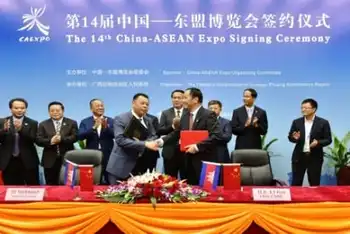China crosses fingers that TVs will stay on
BEIJING, CHINA - With the Beijing Olympics set to start August 8, China is struggling with deepening power shortages across the country that are set to rival the crisis in 2004.
The opening ceremony is sure to attract a huge television audience across the country and people are concerned by the prospect of not being able to watch it.
"That would be outrageous," said Li Ding, a tea businessman and sports lover in landlocked Guizhou province in southwestern China.
"I do expect name-calling and other reactions if power were cut off during the opening ceremony."
Power rationing has been introduced in nearly a half of Chinese provinces and industrial users frequently had their electricity supply cut off as demand surged along with rising temperatures. Supply was limited because coal-fired power plants were running with dwindling coal stocks.
But grid officials are confident that Chinese will be able to sit in front of their television screens to watch the grand opening extravaganza without concerns about power.
"Residential consumption accounts for only 20 percent of China's total power demand, a cut in an enterprise would be enough for use in many, many families," said an official with the State Grid Corp of China's leading grid operator.
"We have informed some local governments that ensuring power supply during the Olympic period is of high importance, though some may still prefer power supply to their pet industry projects," the official said, declining to identify himself because he is not an official spokesperson.
Underscoring the importance of avoiding embarrassing blackouts, vice premier Li Keqiang visited a power company in Shanxi province, telling workers that uninterrupted supply during the Olympics was of "critical importance".
In China, supply to residents and public facilities including government buildings, hospitals and schools is often prioritized while industrial users have to cut use when there are shortages.
"One important example of ensuring power supply to urban and rural residents is to have our province's people watch opening and closing ceremonies, as well as broadcast of games at home at ease," Jiang Daming, governor of coastal Shandong province, said in a report on a government website (www.sdetn.gov.cn).
Shandong, one of China's major industrial bases which produces a tenth of the country's GDP, was facing the worst power crisis in more than a decade, with shortages reaching nearly a third of its demand and the largest supply gap in China by provinces.
Local grid in Guangzhou, a manufacturing hub of southern Guangdong province, will temporarily halt all planned residential blackouts on August 8 and August 24, the days when the Olympics begin and end, local newspaper reported.
"We will try all our effort to ensure power supply to residents so everyone can watch the ceremony," said Zhang Haiyang, head of News Department with the State Grid Corp.
"I cannot afford the expensive tickets, but I should not be deprived of the rights to watch the ceremony because of power outage," said Jiao Yan, a waitress in a Beijing restaurant.
Related News

Sustaining U.S. Nuclear Power And Decarbonization
WASHINGTON - Nuclear power is the single largest source of carbon-free energy in the United States and currently provides nearly 20 percent of the nation’s electrical demand. As a result, many analyses have investigated the potential of future nuclear energy contributions in addressing climate change. However, few assess the value of existing nuclear power reactors.
Research led by Pacific Northwest National Laboratory (PNNL) Earth scientist Son H. Kim, with the Joint Global Change Research Institute (JGCRI), a partnership between PNNL and the University of Maryland, has added insight to the scarce literature and is the first to evaluate nuclear energy…




